|
|
|
Sort Order |
|
|
|
Items / Page
|
|
|
|
|
|
|
| Srl | Item |
| 1 |
ID:
184209
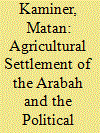

|
|
|
|
|
| Summary/Abstract |
Agricultural settlement geared to capitalist commodity production and accompanied by massive ecological interventions has historically been central to the Zionist colonial project of creating a permanent Jewish presence in the “Land of Israel.” The hyperarid southern region known as the Central Arabah is an instructive edge-case: in the 1960s, after the expulsion of the bedouin population, cooperative settlements were established here and vegetables produced through “Hebrew self-labor,” with generous assistance from the state. In the 1990s the region was again transformed as the importation of migrant workers from Thailand enabled farmers to expand cultivation of bell peppers for global markets. But today ecological destruction, depletion of water resources, and global warming cast doubt over the viability of settlement in this climatically extreme region. I locate the settlements of the Arabah within the historical political ecology of the Zionist movement, arguing that their current fragility exposes the essential precarity of capitalist colonization.
|
|
|
|
|
|
|
|
|
|
|
|
|
|
|
|
| 2 |
ID:
178792
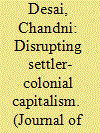

|
|
|
|
|
| Summary/Abstract |
This article explores the resurgence of Indigenous/Palestine solidarity during the Wet’suwet’en land sovereignty struggle in Canada that took place around the same time Donald Trump’s Middle East “peace plan” was released in early 2020. Historicizing this resurgence within a longer period of anti-colonial resistance, the article attends to the distinct historical, political-economic, and juridical formations that undergird settler colonialism in Canada and Israel/Palestine. It contends with the theoretical limits of the settler-colonial framework, pushing back against narratives of settler success, and shows how anti-colonial resistance accelerated economic crises that led both settler states to enter into “negotiations” with the colonized (reconciliation in one case, and peace talks in the other) as a strategy to maintain capitalist settler control over stolen lands. The analysis also sheds light on a praxis of solidarity that has implications for movement building and joint struggle.
|
|
|
|
|
|
|
|
|
|
|
|
|
|
|
|
| 3 |
ID:
161167
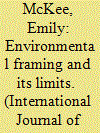

|
|
|
|
|
| Summary/Abstract |
As activists frame campaigns, their region's broader cultural and political context intercedes. In Israel and Palestine attempts to work across national lines and undertake activism that links ecological, economic, and social issues have long been stymied. This article examines how the fraught historical and contemporary relationships of Israelis and Palestinians with land bestow both flexibility and limitations on their framing of campaigns. In particular, it ethnographically analyzes the framing of two projects—the building of an “eco-mosque” and a Jordan River restoration effort—to examine how activists grapple with frame flexibility and its limits. It finds that an Israeli tendency to deterritorialize environmental issues and curb environmental campaigns that are “too political” conflicts with Palestinian criticism of apolitical frames because they euphemize violence and domination. These cases demonstrate how local connotations can make or break environmental campaigns. The eco-adage, “Think global, act local” is not enough. One must think local, too.
|
|
|
|
|
|
|
|
|
|
|
|
|
|
|
|
| 4 |
ID:
158369
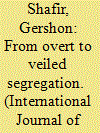

|
|
|
|
|
| Summary/Abstract |
This article's geographical focus is the Galilee, Israel's only region with a Palestinian Arab majority. Its sociological focus is the drive to Judaize this region, the mirror image of its de-Arabization, which I anchor in Israelis’ morbid fear of settler colonial reversal. Although direct legal discrimination—restriction of movement under a military government and exclusion from publicly administered land—was banned by the government and the High Court of Justice respectively, new modes of discrimination against Israel's Arab citizens have replaced the older forms. I demonstrate how policies that limit Arab middle-class citizens’ upwardly mobile migration into the Judaized spaces of communal settlements (or overlooks) and towns endure. I compare gatekeeping exercised by national-level indirect legal discrimination operating through the admission committees of communal settlements with the institutional discrimination practiced by municipalities of emerging mixed towns against new Arab residents’ public presence. Finally, I highlight the linkages between instances of Judaization across the Green Line, which make the unwinding of segregation, in all of its forms, that much harder.
|
|
|
|
|
|
|
|
|
|
|
|
|
|
|
|
| 5 |
ID:
161166
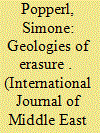

|
|
|
|
|
| Summary/Abstract |
Scientists who study Dead Sea sinkholes come to know them in particular ways (as generalized hydrogeoloic phenomena, symptoms of a regional environmental crisis, or divine retribution) and at particular scales (from the distant orbit of Earth observation satellites, from digitally altered aerial photographs, and occasionally from the inside). Using ethnographic data gathered between 2012 and 2015 in the occupied Palestinian territories (oPt), Israel, and Jordan, I compare how groups and individuals study, think, and learn about Dead Sea sinkholes. The way hydrogeologic knowledge about these sinkholes is gathered and circulated helps define land around the Dead Sea as territory to be colonized. These scientific processes can nullify Palestinian claims to the Dead Sea, eliminate Palestinian people from Dead Sea landscapes, and marginalize Bedouin opposition to Jordanian government policies. I suggest that attention to “geologies of erasure” helps scholars to understand the scientific and political impacts of settler colonialisms on the collection of knowledge about changing natural environments in the Middle East and beyond.
|
|
|
|
|
|
|
|
|
|
|
|
|
|
|
|
| 6 |
ID:
162413
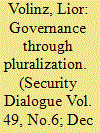

|
|
|
|
|
| Summary/Abstract |
Security responses increasingly involve the delegation of security roles from state actors, such as the police and the military, to a plurality of public and private institutions. This article focuses on the emergence of a modular governance logic in security provision, in which urban security is diffused into differing modules – security actors, performances, technologies and practices – which can be enlisted, deployed, instructed, entwined, detached and withdrawn at will. This article identifies three features of urban modular security provision: the heterogeneity of its public and private components, the development of reserved capacities, and the differential multifacetedness of its performances and practices. These are explored through the case study of East Jerusalem, in which a modular security provision emerged where previously undefined and ad-hoc security arrangements became cohesive, normalized and codified through practice and law. In tracing the flows of security authorities, personnel and knowledge produced within a modular security assemblage, this article proposes that the modular assembly of security actors complements policing institutions by providing other informal disciplinary, punitive and statecrafting powers, in a manner which obfuscates controversial state policies and unequally distributes rights and resources.
|
|
|
|
|
|
|
|
|
|
|
|
|
|
|
|
| 7 |
ID:
161168
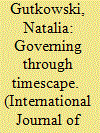

|
|
|
|
|
| Summary/Abstract |
Social scientists commonly know that time is a social construct and a tool for governing by those holding power. Yet, how exactly is time used for governing? This article examines how timescape (embodiment of approaches to time) works in practice as a tool of power by considering multiple networks of time that manifest in al-Batuf/Beit Netofa Valley planning policy. This valley's agriculture, mostly owned by Palestinian-Arab citizens of Israel, is considered by ecologists and officials a unique traditional agriculture landscape and wetland habitat that has become scarce in Israel due to its development and wetland drainage. Assembling separate modes of anthropological inquiry that attend to time as a technique, I show that knowledge, ethics, and time management are not separate spheres of governance but rather interwoven as one timescape tool of governing. Thus, the case of al-Batuf/Beit Netofa elucidates the ways in which time is used for governing in the context of an agricultural-environmental development policy and plan.
|
|
|
|
|
|
|
|
|
|
|
|
|
|
|
|
| 8 |
ID:
175368
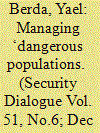

|
|
|
|
|
| Summary/Abstract |
This article traces the historical foundations of current security legislation as the matrix of citizenship. Examining Israel’s new Counter-Terrorism Law against the backdrop of security legislation in India, its main proposition is that these laws and their effects are rooted in colonial emergency regulations and the bureaucratic mechanisms for population control developed therein, rather than in the ‘global war on terror’. The article offers an organizational vantage point from which to understand the development of population-classification practices in terms of an ‘axis of suspicion’ that conflates ‘political risk’ with ‘security risk’. Through an account of the formalization of emergency laws, it explains the effects of colonial bureaucracies of security upon independent regimes seeking legitimacy as new democracies by tracing decisions regarding the use of an inherited arsenal of colonial and settler-colonial practices of security laws for population management, particularly mobility restrictions, surveillance and political control. One of the most important of these effects is the shaping of the citizenship of targeted populations by security laws.
|
|
|
|
|
|
|
|
|
|
|
|
|
|
|
|
| 9 |
ID:
188236


|
|
|
|
|
| Summary/Abstract |
This article discusses the challenges that the settlement process poses to Israeli property regimes, examining the ways that public apparatuses, specifically those related to urban planning, are creatively mobilized to address and mitigate such challenges. The article focuses on two case studies: the Palestinian village of Kamanneh in the Upper Galilee and the Ganey Aviv neighborhood of Lydda, one of Israel’s so-called mixed cities. Based on these case studies, the paper argues that the planning process’s technical and legal manipulations as well as the raw political power involved produce and reproduce the settler-colonial logic of ownership in land as a territorial and symbolic mechanism of control.
|
|
|
|
|
|
|
|
|
|
|
|
|
|
|
|
| 10 |
ID:
179082
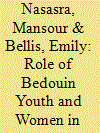

|
|
|
|
|
| Summary/Abstract |
Naqab Bedouin resistance and political activism against the Israeli Prawer plans attracted attention in many local and international contexts and became a symbol of sumud [steadfastness] among Palestinians in Israel. In fact, the Bedouin, led at this time by motivated youth and women activists, showed greater creative, tactical and strategic agency and skills than politicians and scholars acknowledged in the past, and they actively contributed to shaping aspects of their own destiny within the state structure. We argue that creative, nonviolent, everyday and political resistance and activism, led by the young Bedouin [al-hirak al-shababi], succeeded in modifying and mitigating the Israeli Prawer Plan policies and strategies to relocate and expel the Bedouin from their historical villages. This study draws on a number of in-depth interviews in the Naqab with male and female youth, activists, and politicians. Specifically, it shows how Bedouin women and youth were key actors in resisting the Prawer Plan using social media tactics, which later led to Israeli withdrawal and freezing of the plan in 2013. The evolution of Bedouin resistance and the prevailing misrepresentation of the Bedouin is identified and tested through the case study of the anti-Prawer campaign and the Naqab Bedouin villagers’ on-going resistance to being forcibly relocated from their historical land in the Naqab.
|
|
|
|
|
|
|
|
|
|
|
|
|
|
|
|
|
|
|
|
|